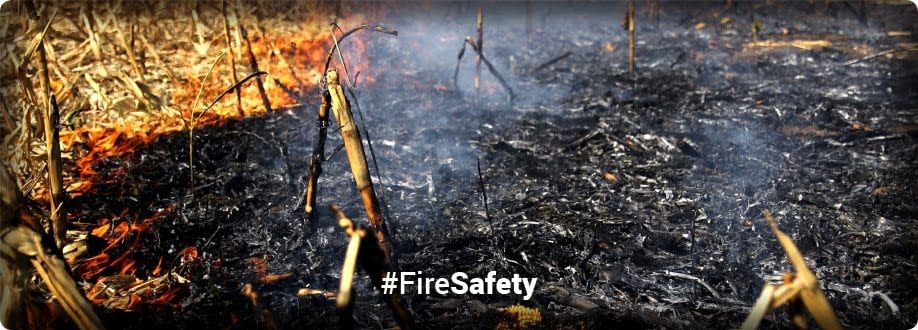
There are a lot of fire hazards on the farm, especially during harvest time. Dry crops and chaff offer plenty of fuel in fields and barns, on combines, and around other heavy farm equipment.
 Fields and equipment
Fields and equipment
The Iowa State Extension has put together a list of safety precautions to help make your harvest safe and bountiful.
- Carry a minimum of two class ABC fire extinguishers: a smaller 10-pound unit in the cab and a larger 20-pound extinguisher at ground level on the combine. Give the extinguishers a shake once or twice a season to make sure the retardant inside is not compacted.
- Have an additional extinguisher on each motorized piece of equipment used in the field.
- Check engine fluid levels (such as coolant and oil) at the beginning of each day.
- Blow leaves, dust, and chaff off the engine with compressed air or a leaf blower. Older combines can be particularly susceptible to collecting debris.
- Make sure exhaust and other hot surfaces are free of combustible material, too.
- If your equipment has a turbocharger shaft, check the pressurized oil-supply line to that shaft for areas that may rub from wear and start an oil leak.
- If field welding on equipment is necessary, wet down the area under and around the implement first.
 Barns
Barns
According to a Rutgers University Cooperative Extension study of insurance statistics, the most common time for barn fires are summer and winter. A firm no-smoking-in-the-barn rule (providing butt cans outside) is one of the easiest ways to prevent a barn fire.
Follow good anti-fire “hygiene” during harvest.
- Keep cobwebs, dust, and grain dust at bay as much as possible, especially near machinery and electrical and heat sources.
- Keep aisles clear of hay or bedding. Pick up trash and twigs around the outside of the barn. (This can be a great way for children to help at harvest.)
- Store accelerants in approved and accurately labeled containers (plastic milk jugs don’t count). Keep a list of what you have and where you have for the fire department; they’ll need to know what they’re dealing with.
- Keep drying hay bales adequately ventilated to avoid spontaneous combustion and mold growth.
- Keep vehicles and machinery in a separate building.
To speak with someone in person, please us at Pardridge Insurance – 815-758-4447.
More information about fire prevention
This article is part of a Grinnell Mutual Insurance series of articles for Fire Prevention Week. Read the other articles in the series.
- Proper smoke alarm placement can save your life
- VIDEO: Residential fire sprinklers save lives
- Have a fire escape plan
- If you can’t stand the heat … prevent kitchen fires
Visit the Front Porch blog on grinnellmutual.com for more fire safety tips.
Tagged With: fire safety, insurance

